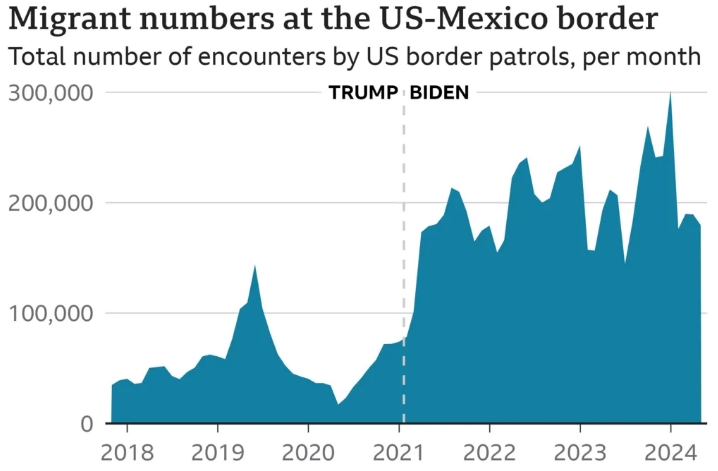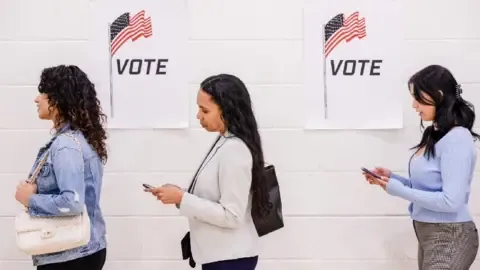Introduction
As the 2024 US presidential election approaches, approximately 240 million eligible voters across the country are gearing up for one of the most significant electoral decisions in recent history. However, despite this vast electorate, the outcome of the presidential race may hinge on just a handful of pivotal states. These key battlegrounds are expected to play a crucial role in determining the next president. In this comprehensive analysis, we will delve into the six swing states that are likely to be the focus of intense campaigning and strategic maneuvering by both major political parties: Arizona, Georgia, Michigan, Nevada, Pennsylvania, and Wisconsin.
Arizona: A Crucial Battleground
Recent Electoral History
Arizona has become a focal point in the 2024 election due to its pivotal role in the 2020 presidential race. In that election, President Joe Biden secured a narrow victory in the Grand Canyon State, marking a significant shift as it had traditionally leaned Republican for decades. The state’s changing political landscape reflects broader demographic and political shifts that are shaping its role in national elections.
Immigration and Border Issues
Arizona’s proximity to the US-Mexico border has made immigration a central issue in its political discourse. Under the Biden administration, the state has experienced record-high border crossings, which have become a major point of contention. Biden’s approach to immigration, including plans for border shutdowns and tighter controls, has been both criticized and defended. Donald Trump, the Republican challenger, has seized on this issue, attacking Kamala Harris, the likely Democratic nominee, for her role in managing border affairs. Trump has pledged to undertake what he describes as the “largest deportation operation” in US history if he is elected.

Abortion and Social Issues
The abortion debate has further intensified in Arizona. Recent attempts by state Republicans to reinstate a near-total abortion ban have sparked significant controversy. This issue has become even more charged nationwide since the Supreme Court’s 2022 decision to overturn a landmark ruling that had previously protected abortion rights. Arizona’s position on this matter will likely influence voter sentiment significantly.
Georgia: Legal Challenges and Demographic Shifts
Electoral Controversies
Georgia has been a battleground state in recent elections and continues to be a focal point due to ongoing legal challenges involving former President Donald Trump. Trump, along with 18 others, is facing accusations of conspiring to overturn the results of the 2020 election in Georgia. This legal situation adds a layer of complexity to the state’s electoral landscape, though it remains unclear how these legal battles will impact Trump’s support among voters.

Demographic Dynamics
Georgia’s electorate is notably diverse, with a significant proportion of African-American voters. In the 2020 election, this demographic was instrumental in Biden’s narrow victory in the state. However, there is reported disillusionment among some Black voters regarding Biden’s performance on issues of racial justice and economic equality. This discontent could play a critical role in the state’s electoral outcome.
Michigan: A Symbolic Swing State
Recent Electoral Patterns
Michigan has consistently been a decisive state in recent presidential elections. Biden’s 2020 victory in Michigan reflected a broader shift in the state’s political alignment. However, the state has become symbolic of a backlash against Biden’s foreign policy, particularly his support for Israel during the conflict in Gaza.

Arab-American Voters
Michigan’s large Arab-American population has been vocal in expressing its concerns over the US government’s stance on the Gaza conflict. During the state’s Democratic primary, more than 100,000 voters chose the “uncommitted” option, signaling dissatisfaction with the current administration’s policies. Kamala Harris, the Democratic candidate, has faced pressure to adopt a more sympathetic stance towards Palestinian issues, which could impact her support among Michigan voters.
Nevada: Economic Challenges and Electoral Shifts
Economic Indicators
Nevada has traditionally leaned Democratic in recent elections, but recent developments suggest a potential shift. The state has been grappling with a slower post-COVID economic recovery compared to other regions. With the highest unemployment rate in the country, Nevada’s economic struggles are a significant concern for voters. Biden’s administration has faced criticism for the slow recovery, and Trump has promised to address economic issues with a return to lower taxes and fewer regulations if elected.

Latino Voters
Both major candidates are vying for Nevada’s sizeable Latino population. The outcome in this demographic group could be pivotal, as Latino voters have been influential in recent elections. The focus on economic recovery and job creation will likely be a key factor in shaping Latino voter preferences.
Pennsylvania: Economic Pressures and Electoral Importance
Cost-of-Living Concerns
Pennsylvania’s high cost of living, exacerbated by inflation, is a critical issue for many voters. The state has seen rapid increases in grocery prices, leading to significant financial strain for residents. This economic pressure is reflected in the struggles faced by communities like Erie, where food insecurity is a pressing concern.

Biden’s Connection to Pennsylvania
President Biden’s deep connection to Pennsylvania, particularly to Scranton where he grew up, adds a personal dimension to his campaign. However, high inflation rates and economic challenges could undermine his support. Trump has leveraged these issues to criticize Biden’s handling of the economy, further intensifying the electoral battle in the state.
Wisconsin: A Battleground with High Stakes
Tight Electoral Margins
Wisconsin has been a crucial swing state in both the 2016 and 2020 elections, with narrow victories for the winning candidate. The state’s significance is underscored by Trump’s characterization of it as “really important” to his electoral strategy. The upcoming summer Republican National Convention will be held in Milwaukee, adding to the state’s prominence in the election cycle.

Third-Party Influence
Polling suggests that third-party candidates, such as Robert F. Kennedy Jr., could play a role in Wisconsin’s election outcome. Support for independent candidates may impact the vote tallies for both major party candidates, making Wisconsin an even more unpredictable battleground.
Conclusion
As the 2024 presidential election approaches, the outcome may hinge on the results from these six pivotal swing states: Arizona, Georgia, Michigan, Nevada, Pennsylvania, and Wisconsin. Each state presents unique challenges and opportunities for both candidates, influenced by a range of issues from immigration and abortion to economic pressures and legal controversies. Understanding these dynamics is crucial for anticipating the election’s direction and the strategies that candidates will employ in their final push for victory.
For more in-depth coverage and updates on the US presidential election, visit our US & CANADA section.


